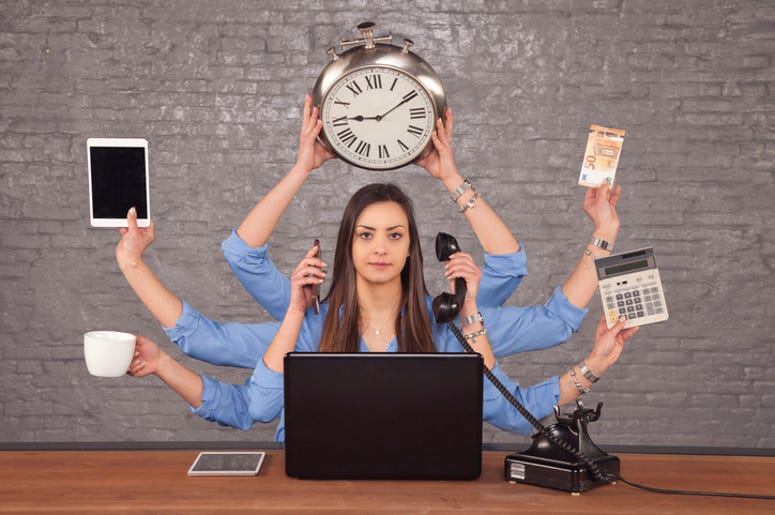
Welcome to WinnerTrick.com — the best source for success and personal development articles, motivational quotes, and tips to live your best life.
contact@winnertrick.com
Multitasking might give off the illusion of high efficiency—juggling several tasks at once, ticking them off faster, and keeping momentum going. But beneath this surface-level perception lies a hard truth: research shows that multitasking actually hampers productivity, potentially slashing it by up to 40%. That’s not a small dip—it’s nearly cutting your potential in half.
So, why is multitasking such a trap? At a glance, it looks like we’re simultaneously conquering multiple goals. What’s really happening, though, is rapid switching between tasks. Each time we shift attention from one thing to another, our brain undergoes a reset. This transition brings in distractions, cognitive friction, and slowdowns that we barely notice, but which pile up quickly.
Multitasking isn’t just doing two things at once. It can take a few different forms, such as:
Juggling multiple tasks simultaneously
Jumping back and forth between different duties
Rapidly shifting focus from one thing to the next in succession
No matter the form, the effect on your mental processing is more or less the same—and it’s not in your favor.
Take stock of your current activity. You’re reading this article, sure. But are you also checking your messages? Listening to music? Responding to an email? Browsing social media? If so, you fall under the category of a "heavy multitasker."
Chances are, you also believe you’re pretty efficient at it. But according to multiple scientific investigations, that belief might be an illusion.
Switching tasks—also known as task-switching—comes at a cognitive cost. People who attempt to multitask often struggle to filter out irrelevant stimuli, meaning they’re more prone to distractions. On top of that, their ability to retain and process information diminishes.
In a study conducted by researchers Robert Rogers and Stephen Monsell, participants were asked to alternate between tasks. The result? Their performance slowed each time they had to switch, compared to when they repeated the same activity. The slowdown, while it may seem negligible in milliseconds, adds up significantly in high-stakes or time-sensitive environments.

A separate study by Joshua Rubinstein, Jeffrey Evans, and David Meyer dug deeper. They discovered that the more complex the tasks became, the more time participants lost in transition. It’s not just about the quantity of tasks—it’s also about the difficulty level.
At the core of our multitasking capability is something called executive function. These mental processes control the order and manner in which tasks are approached and executed.
Researchers Meyer, Evans, and Rubinstein break down executive function into two key processes:
Goal Shifting – Making the choice to pivot from one task to another.
Rule Activation – Letting go of the previous task’s logic or structure, and adopting the new one.
Even though this shift takes mere fractions of a second, repeated changes cause cumulative lag. This might be inconsequential while folding laundry and watching TV. But in high-pressure situations—like managing traffic or handling heavy machinery—it could be the margin between success and failure.
Meyer estimates that the mental disruption from multitasking can reduce your effectiveness by up to 40%. With that in mind, reevaluating how you spend your time becomes crucial.
If you catch yourself trying to multitask, pause and assess: What are the tasks in front of me? Are they competing for the same mental resources? Can I eliminate one to give my full attention to the other?
When possible, strip away distractions and dedicate yourself to one task at a time. Your brain—and your results—will thank you.
Think about a typical day. You're flipping between tabs, replying to texts, scrolling through feeds, maybe watching something in the background. Sound familiar?
While this isn’t a new phenomenon, the sheer volume of incoming stimuli today is historically unprecedented. Constant bombardment from devices and digital media doesn't just interfere with focus—it might also harm your brain in the long run.
Research out of Stanford University led by Clifford Nass found that heavy multitaskers perform poorly when it comes to filtering out unimportant data. Contrary to expectations, they were worse—not better—at this than light multitaskers.
These individuals also found it harder to transition between tasks and exhibited decreased mental organization. And here’s the most sobering part: these deficits persisted even when they weren’t multitasking. Just being used to a multitasking lifestyle appeared to dull their cognitive processing overall.

Nass explained in an interview that the implications were larger than just productivity: “Even when we did not ask them to multitask, their cognitive systems remained compromised. They performed worse at deep thinking and strategic processing—tasks critical to success in nearly every field.”
Adolescents, in particular, may be at greater risk. Their brains are still developing crucial neural pathways. If they’re consistently fragmenting their focus with rapid, distracted inputs, they could form weaker connections over time—ones that shape their cognitive baseline well into adulthood.
This concern has led experts to believe that chronic multitasking might not just affect performance—it could fundamentally alter how young minds develop.
Now that you know multitasking isn’t the superpower we once believed it to be, the next logical question is—can the damage be reversed? Fortunately, research offers a hopeful outlook. According to Clifford Nass, while multitasking can degrade the brain’s performance, stopping the habit can allow cognitive functions to bounce back. But to make that shift, intentional effort is necessary.
Here are two practical methods to reduce the negative impact of multitasking:
Keep it to just two tasks: Try not to juggle more than two items at any given time. If you're responding to an email, don't simultaneously skim an article or glance at notifications. Finish the email first, then move on.
Apply the 20-minute focus rule: Dedicate your full attention to one task for at least 20 minutes before switching. This strategy allows your brain to stay in flow, minimizing the cognitive cost of switching between different tasks too frequently.
These techniques can help you rewire your brain toward deeper concentration and more efficient output—something especially valuable in fast-paced or demanding environments.
While many studies highlight the downsides of multitasking, it's important to note that it's not universally harmful. Some research even points to specific cognitive advantages in certain contexts.
For example, media multitasking—engaging with multiple forms of digital media simultaneously—might have some upsides. In one study involving individuals aged 19 to 28, researchers explored how participants handled tasks that combined visual and auditory elements.
The findings revealed something interesting: those who frequently engaged in media multitasking performed better at tasks that involved both sound and visual cues. When a sound signaled a change in the task (like a color shift), heavy multitaskers were quicker and more accurate than their light- or medium-level counterparts.
However, the reverse was also true—without that extra sound cue, heavy multitaskers performed worse. So while multitasking may improve sensory integration in some scenarios, it may still impair performance in simpler, single-stream tasks.
As the researchers themselves stated, “Media multitasking may not always be a bad thing.” Context matters.
One of the biggest traps of multitasking is how automatic it can become. Many people don't even realize when they’re doing it. You could be responding to a text, half-listening to a podcast, and organizing files—all at the same time—without even thinking twice about it.
That’s why mindfulness is key. Pay attention to your behaviors and environment. Ask yourself periodically: Am I truly focused right now? Or am I diffusing my attention across multiple things?
Refocusing on one task at a time won’t just help you become more productive—it can also make your day feel less chaotic. You’ll experience tasks with greater clarity, and you might even begin to enjoy them more, simply because you’re fully present.
Multitasking isn’t going away anytime soon, especially in a world driven by devices, notifications, and high-speed expectations. But your relationship with it can change. With awareness and discipline, you can take back control over your attention—and protect your brain in the process.
Make sure you enter all the required information, indicated by an asterisk (*). HTML code is not allowed.